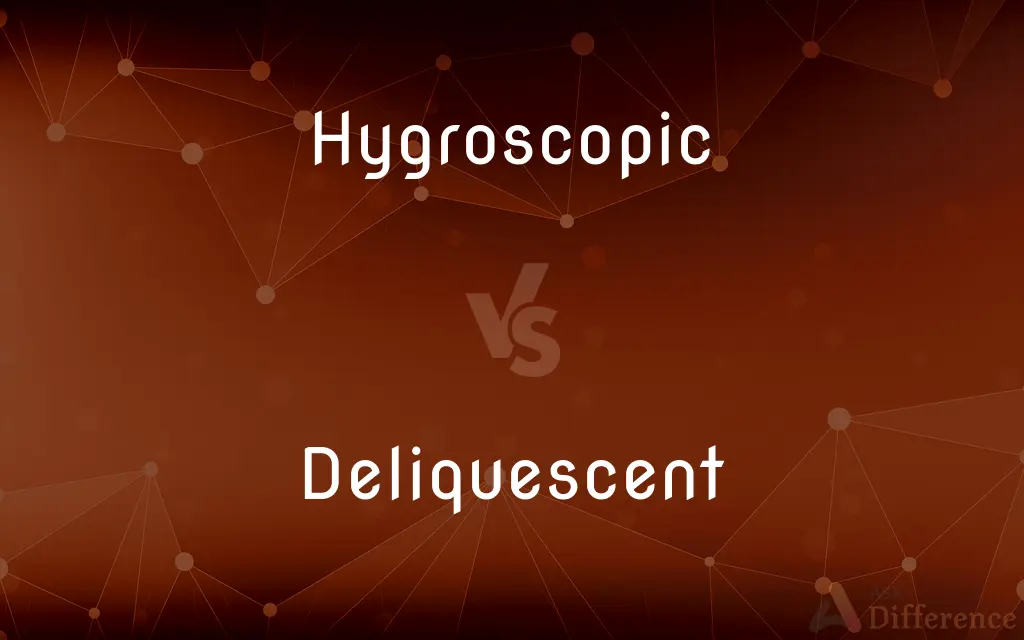Hygroscopic vs. Deliquescent — What's the Difference?
By Tayyaba Rehman — Published on October 1, 2023
Hygroscopic substances absorb moisture from the air, while deliquescent substances absorb enough moisture to dissolve and form a solution.

Difference Between Hygroscopic and Deliquescent
Table of Contents
ADVERTISEMENT
Comparison Chart
Meaning
Absorbs moisture from the air
Absorbs moisture and dissolves into it
Result
Stays solid but moist
Becomes a liquid solution
Usage
Common in industries requiring moisture regulation
Observed in chemicals that readily dissolve upon moisture contact
Relation to Humidity
Affected by humidity but does not always dissolve
Can dissolve in high humidity
Extent of Absorption
Absorbs moisture to a certain extent
Absorbs moisture until dissolution
ADVERTISEMENT
Compare with Definitions
Hygroscopic
Retains water from the surrounding environment.
Wood is hygroscopic, which can lead to expansion and contraction.
Deliquescent
Absorbs moisture until it dissolves.
Certain salts are deliquescent and can turn into a puddle in high humidity.
Hygroscopic
Pertains to moisture absorption.
Silica gel is hygroscopic and is used to keep products dry.
Deliquescent
Transforms from solid to liquid due to moisture.
The deliquescent nature of some substances can complicate their storage.
Hygroscopic
Relates to the affinity for water.
Certain chemicals are hygroscopic and need special storage conditions.
Deliquescent
Dissolves upon absorbing atmospheric water vapor.
It's surprising how a deliquescent crystal can vanish into a solution.
Hygroscopic
Can attract and hold water molecules.
Salt is hygroscopic and can clump together in humid conditions.
Deliquescent
Has an extreme reaction to environmental moisture.
A deliquescent compound might be found as a liquid in a humid environment.
Hygroscopic
Prevents desiccation in certain environments.
Hygroscopic substances can extend the shelf life of food items.
Deliquescent
To melt away.
Hygroscopic
Readily absorbing moisture, as from the atmosphere.
Deliquescent
To disappear as if by melting.
Hygroscopic
Readily taking up and retaining water, especially from the atmosphere.
Deliquescent
(Chemistry) To dissolve and become liquid by absorbing moisture from the air.
Hygroscopic
Of or pertaining to, or indicated by, the hygroscope; not readily manifest to the senses, but capable of detection by the hygroscope; as, glass is often covered with a film of hygroscopic moisture.
Deliquescent
To become fluid or soft on maturing, as certain fungal structures.
Hygroscopic
Having the property of readily inbibing moisture from the atmosphere, or of the becoming coated with a thin film of moisture, as glass, etc.
Deliquescent
To branch out into numerous subdivisions that lack a main axis, as the trunk of an elm.
Hygroscopic
Absorbing moisture (as from the air)
Deliquescent
Seeming to melt away.
Deliquescent
(chemistry) Absorbing moisture from the air and forming a solution.
Deliquescent salts
Deliquescent
(botany) Branching so that the stem is lost in branches, as in most deciduous trees.
Deliquescent
Becoming liquid as a phase of its life cycle.
Deliquescent
Dissolving; liquefying by contact with the air; capable of attracting moisture from the atmosphere and becoming liquid; as, deliquescent salts.
Deliquescent
Branching so that the stem is lost in branches, as in most deciduous trees.
Deliquescent
(especially of certain salts) becoming liquid by absorbing moisture from the air
Deliquescent
Pertains to the dissolution due to water absorption.
In the lab, deliquescent samples require tightly sealed containers.
Common Curiosities
What does it mean if a substance is hygroscopic?
A hygroscopic substance can absorb and retain moisture from the air.
Can deliquescent substances revert back to solids?
If the absorbed moisture is removed or evaporates, deliquescent substances can return to a solid state.
How do deliquescent substances react to humidity?
Deliquescent substances can absorb so much moisture from the air that they dissolve and form a solution.
Why is understanding hygroscopic properties important in industries?
Hygroscopic properties are crucial in industries like pharmaceuticals to ensure products stay dry and maintain their efficacy.
How can one protect hygroscopic substances from moisture?
Using desiccants, sealed containers, and controlled environments can protect hygroscopic substances from moisture.
Are all salts deliquescent?
No, not all salts are deliquescent, but many have the ability to absorb moisture to some extent.
Is the opposite of hygroscopic "hydrophobic"?
No, hydrophobic means water-repelling. The opposite of hygroscopic is anhydrous, which lacks water.
Can we predict if a substance is deliquescent by its appearance?
No, the appearance doesn't always indicate deliquescence; it's based on the substance's chemical properties.
Can a substance be both hygroscopic and deliquescent?
Yes, if a substance is deliquescent, it's also hygroscopic, but not all hygroscopic substances are deliquescent.
Can atmospheric conditions impact the extent of deliquescence?
Yes, higher humidity can accelerate the process of deliquescence in susceptible materials.
Do deliquescent substances always turn into a solution?
Deliquescent substances will form a solution when they absorb enough moisture, but the amount required can vary.
Why might one encounter clumping in hygroscopic materials?
Clumping can occur when hygroscopic materials absorb moisture, leading the particles to stick together.
Is there any risk associated with handling deliquescent substances?
Yes, depending on the substance, it can be corrosive or harmful when it becomes a solution.
Do all hygroscopic materials have the same affinity for water?
No, the degree to which hygroscopic materials absorb water can vary significantly based on their composition and environment.
Which is a stronger characteristic, hygroscopic or deliquescent?
Deliquescent is a stronger characteristic as it involves dissolution due to moisture absorption.
Share Your Discovery

Previous Comparison
Will vs. Going To
Next Comparison
Beachfront vs. OceanfrontAuthor Spotlight
Written by
Tayyaba RehmanTayyaba Rehman is a distinguished writer, currently serving as a primary contributor to askdifference.com. As a researcher in semantics and etymology, Tayyaba's passion for the complexity of languages and their distinctions has found a perfect home on the platform. Tayyaba delves into the intricacies of language, distinguishing between commonly confused words and phrases, thereby providing clarity for readers worldwide.
















































